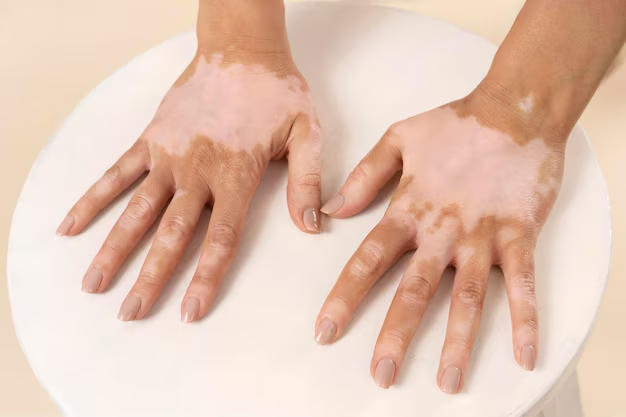Vitiligo, a condition characterized by the loss of skin pigmentation, can manifest in diverse ways, varying in severity and extent from person to person. Identifying the symptoms early is vital for timely treatment and effective management. For individuals seeking help, consulting the best vitiligo doctor in Kolkata is often the first step toward understanding and addressing this condition.
Key Symptoms of Vitiligo
Vitiligo typically begins with small patches of depigmentation on the skin, which may gradually expand over time. The following are some of the common signs to watch for:
- Appearance of White Patches
- The most recognizable symptom of vitiligo is the development of milky-white or lighter patches on the skin. These areas commonly appear on sun-exposed parts of the body, such as the face, hands, and arms.
- Change in Hair Color
- In some cases, vitiligo affects the pigment of body hair, resulting in premature whitening or graying of hair on the scalp, eyebrows, or beard.
- Loss of Color in Mucous Membranes
- Depigmentation can occur in the mucous membranes inside the mouth and nose, though this is less common.
- Irregular Progression
- Vitiligo progresses unpredictably, with some people experiencing slow development, while others notice rapid changes. The condition may stabilize for a while before becoming active again.
- Symmetry of Depigmentation
- In many cases, vitiligo appears symmetrically on both sides of the body. However, it can also occur in isolated patches, depending on the type and severity of the condition.
Types of Vitiligo
Vitiligo can be classified into several types based on its distribution and progression:
- Segmental Vitiligo: Affects one side of the body, often localized to a specific area.
- Non-Segmental Vitiligo: The most common type, characterized by symmetrical patches on both sides of the body.
- Focal Vitiligo: Limited to one or a few areas and does not spread significantly.
- Universal Vitiligo: A rare form where depigmentation covers most of the body.
If any of these symptoms are observed, seeking guidance from the best vitiligo doctor in Kolkata can help clarify the type and stage of vitiligo.
Factors Contributing to Vitiligo
Vitiligo results from the destruction of melanocytes, the cells responsible for producing skin pigment. While the exact cause is unknown, certain factors are believed to contribute to its development:
- Autoimmune Disorders
- The immune system mistakenly attacks the body’s melanocytes, leading to pigmentation loss.
- Genetic Predisposition
- Family history plays a role, as individuals with a genetic predisposition may have a higher likelihood of developing vitiligo.
- Environmental Triggers
- Exposure to chemicals, skin trauma, or excessive sunburn may act as triggers in susceptible individuals.
- Emotional Stress
- Psychological stress is thought to exacerbate the onset or progression of vitiligo in some cases.
Importance of Early Detection
Early detection of vitiligo can make a significant difference in managing the condition. Timely consultation with the best vitiligo doctor in Kolkata enables individuals to understand their symptoms, receive an accurate diagnosis, and begin treatment options that suit their specific needs.
Treatment Approaches for Vitiligo
Treatment for vitiligo focuses on slowing the progression of depigmentation and restoring skin color. Common strategies include:
- Topical Therapies
- Corticosteroids and calcineurin inhibitors are frequently prescribed to manage inflammation and stimulate repigmentation in affected areas.
- Light-Based Treatments
- Phototherapy, particularly narrowband ultraviolet B (NB-UVB), is effective in encouraging melanocyte activity and repigmentation.
- Surgical Options
- For localized vitiligo, skin grafting or melanocyte transplantation may be recommended to restore pigmentation.
- Cosmetic Solutions
- Makeup and self-tanning products are often used to conceal depigmented patches and improve self-confidence.
- Lifestyle Adjustments
- Protecting the skin from sun exposure and maintaining a balanced diet can support overall skin health.
Psychological Impact of Vitiligo
Beyond its physical manifestations, vitiligo often affects individuals emotionally and socially. Many people experience low self-esteem or anxiety about their appearance, which underscores the importance of psychological support.
Seeking guidance from Cosmetic Surgery by Dr. Akhilesh Agarwal, one of the best vitiligo doctors in Kolkata, can provide not only medical care but also emotional reassurance. Dr. Akhilesh Agarwal collaborates with counselors or psychologists to help patients cope with the challenges associated with vitiligo.
Myths About Vitiligo
Vitiligo is often misunderstood, leading to the perpetuation of myths and misconceptions. Addressing these misconceptions is essential for promoting awareness and reducing stigma:
- “Vitiligo Is Contagious”
- Vitiligo is not contagious and cannot be spread through physical contact.
- “Vitiligo Cannot Be Treated”
- While there is no definitive cure, various treatments can effectively manage symptoms and restore pigmentation.
- “Only Dark-Skinned Individuals Get Vitiligo”
- Vitiligo affects individuals of all skin types and ethnicities.
Supporting Someone with Vitiligo
If a loved one is living with vitiligo, providing emotional support can make a significant difference. Encourage them to consult the best vitiligo doctor in Kolkata and reassure them that their condition does not define their worth or beauty.
Conclusion
Recognizing the early symptoms of vitiligo is crucial for timely intervention and management. By understanding the physical, emotional, and social aspects of this condition, individuals can seek appropriate care and live fulfilling lives.
Consulting the best vitiligo doctor in Kolkata ensures access to specialized treatments tailored to individual needs. With advancements in medical science and growing awareness, individuals with vitiligo can find effective solutions that restore their confidence and enhance their quality of life.





Comments